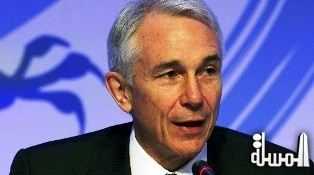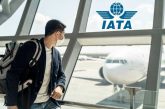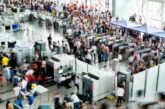
IATA head focuses on financial sustainability
ATP- Arab tourism portal- International Air Transport Association (IATA) Director General and CEO Tony Tyler told the World Financial Symposium in Barcelona that the air travel industry expects a net profit of $29.3 billion on revenues of $727 billion, for a net profit margin of four percent.
Tyler said this means the airline industry on average is finally earning its cost of capital, and highlighted four areas where industry stakeholders have opportunities to set a path toward long-term financial sustainability.
Those four areas are smarter regulation, rebalancing the value chain, innovation and efficient processes, and Tyler said that addressing them could address what he termed an historical inability of the aviation industry to create value for its equity investors
He cited the "enormous value" the aviation delivers to the global economy: $2.4 trillion contributed to GDP, carrying over a third of world trade by value and supporting some 58 million jobs, including aviation-related tourism.

Tyler sought to bring perspective to the industry’s ability to turn a profit in 2015: more than half of the global profits are being made in North America, he said, adding that while the overall fortunes of the industry are improving, for many airlines the struggle to keep revenues ahead of costs is still a formidable challenge."Furthermore, we must recognize that for any other industry, earning the cost of capital is the absolute minimum performance expected. And we will have to continue this performance for the foreseeable future in order to attract the $5 trillion of capital required to support the doubling of air travel expected over the next two decades," Tyler said. "…If our industry is not profitable, we will not be able to satisfy future demand — and we will certainly not achieve our ambitious environmental targets in the desired timeframe.
 "We are working alongside our members through the IATA financial committee and all of our industry committees on a critical agenda to ensure the future of this important industry by placing it on a firm financial footing.
"We are working alongside our members through the IATA financial committee and all of our industry committees on a critical agenda to ensure the future of this important industry by placing it on a firm financial footing.
Four strategic themes guide our activities. These are: smarter regulation, rebalancing the value chain, innovation and efficient processes and smarter regulation.Smarter regulation, he said, covers a wide range of activities including regulations addressing environment, consumer protection, flight training, fuel costs and more.
"Now, the industry does not oppose sensible, well thought-out regulation, developed with participation from all stakeholders. Indeed, regulation advanced in partnership with industry and based on global standards is a cornerstone of our success in making aviation so safe
."But when it comes to consumer protection legislation we are not seeing this partnership approach from many states, nor a commitment to embracing global standards in drafting regulations. Instead, we have a proliferation of prescriptive, un harmonized passenger rights regimes around the world that create difficulties for the industry and confusion for customers. Furthermore, the purpose of many of these regulations appears to be to defend passengers from airlines.
"This results in rules which reduce consumer protection and convenience – through higher fares, less choice and more confusion — and which raise costs for airlines which must comply with a plethora of differing and often conflicting regulatory regimes," Tyler said.
 He asserted that airlines, governments and passengers share a common goal of getting to destinations safely, reliably and on time, and argued that airlines already have many policies in place to ensure passengers are looked after. IATA members, he added, have also unanimously agreed core principles on consumer protection that are aligned with the International Civil Aviation Organization (ICAO).
He asserted that airlines, governments and passengers share a common goal of getting to destinations safely, reliably and on time, and argued that airlines already have many policies in place to ensure passengers are looked after. IATA members, he added, have also unanimously agreed core principles on consumer protection that are aligned with the International Civil Aviation Organization (ICAO).
Tyler noted that managing the cost of fuel is another priority for airlines."Even with the global collapse in oil prices, fuel represents the largest expense category for most carriers.
In 2015, we expect airlines to pay some $191 billion for fuel, or around 28 percent of total operating expenses. And in many cases, airlines are not seeing the full benefit of lower costs owing to lack of competition among airport fuel suppliers, onerous duties and taxes and/or excessive fuel fees," he said.
The IATA DG outlined a four-fold approach to dealing with fuel costs: support open access to jet fuel infrastructure and competitive jet fuel markets at airports and address unjustified fees, while supporting ICAO standards that discourage taxation on jet fuel sold for international flights; encourage transparency in the jet fuel price structure to ensure that items impacting the final jet fuel prices are cost-related; ensure that supply reliability issues are addressed; and lobby for a political and legislative framework that incentivizes cost-effective large scale production of biofuels and to cooperate with biofuels producers to make it a viable alternative to conventional fuels.
Tyler noted that as airlines work to persuade regulators to embrace smarter regulation, they are also focusing on addressing imbalances in value chain profitability; despite the improved performance, financial risk and reward are far from being equally distributed across the aviation value chain, he said."In fact, airlines earn the lowest returns while bearing the second highest level of risk.
In competitive markets, investors would expect to earn a higher return on investment if they face a higher risk or volatility on returns. Apparently, aviation is different," he said."The industry has been able to save or avoid billions of dollars in costs through collaborative efforts such as e-ticketing, bar-coded boarding passes, Fast Travel, the baggage improvement program and its successor, InBag.
.jpg)
Similar levels of savings are expected through the transition to paperless cargo via the e-freight initiative–so please help make it a reality by adopting the e-Air Waybill," he urged.He added that the largest contribution to airline financial well-being is the provision of safe, secure, efficient systems for the movement of funds between the different parts of the value chain.
In 2014, the IATA Settlement Systems (ISS) settled $388.1 billion in industry funds with a net unrecovered rate on gross sales at or below 0.059 percent with an on-time rate at 99.987 percent."However, the rules for the ISS were established decades ago using a one-size-fits-all approach that does not address the diverse and complex needs and risks of airlines and travel agents today.
The New Generation of ISS aims at transforming the current business model by delivering faster cash flow management, increased security, lower costs and new payment methods with a choice of agent accreditation models.
It is a multi-year program that will ensure that the ISS is fit for purpose and mutually benefiting airlines and agents for the next 70 years of IATA."







